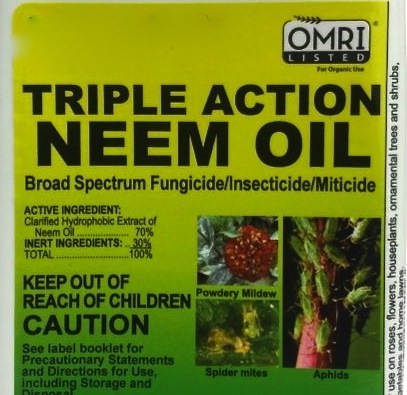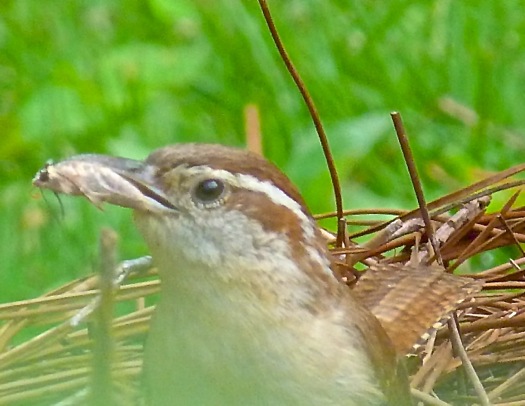An Organic Solution for Plant Disease and Harmful Insects
 Sunday, June 11, 2017 at 3:45PM
Sunday, June 11, 2017 at 3:45PM A rich fungal smell is in the air. In my area during late May and June, plentiful rain and increasing humidity promote all sorts of plant diseases and harmful insects. Blights, black spot, anthracnose and powdery mildew afflict previously pristine leaves. Colonies of aphids and whiteflies feed voraciously on succulent plant juices. If I want to have a healthy garden, I have to spray.
Most diseases in the garden are caused by fungus. As an organic gardener, I try to prevent the problems by spraying with neem oil, which reduces disease and kills harmful bugs such as mites, scales, aphids and whiteflies.  Oils have limited or no affect on beneficial insects. Neem oil is a vegetable oil pressed from the fruits and seeds of the Neem tree. I immediately remove any diseased leaves when I see them, and I start spraying with a neem oil solution toward the end of May and continue to spray weekly through June, or until I don't see new disease or colonies of whiteflies and aphids. I also use neem oil in late winter as a preventative and to kill fire blight, a bacterial disease that causes the leaves of plants to wilt and to appear as if they have been burned. Fire blight overwinters on branches, twigs, and trunks.
Oils have limited or no affect on beneficial insects. Neem oil is a vegetable oil pressed from the fruits and seeds of the Neem tree. I immediately remove any diseased leaves when I see them, and I start spraying with a neem oil solution toward the end of May and continue to spray weekly through June, or until I don't see new disease or colonies of whiteflies and aphids. I also use neem oil in late winter as a preventative and to kill fire blight, a bacterial disease that causes the leaves of plants to wilt and to appear as if they have been burned. Fire blight overwinters on branches, twigs, and trunks.
Sometimes I use a horticultural mineral oil, which is effective for similar problems (although neem oil appears to have better fungicidal properties, probably because neem contains sulfur-like compounds, which have their own fungicidal properties). There are two types of horticultural oils. Dormant oils are used as a preventative in late winter or early spring when the weather is cool, while all-season oil can be used during the growing season also. Always read the labels. Most horticultural oils cannot be used during very hot weather. I use an all-season oil. I spray during the cooler parts of the day, and I avoid spraying any good guys such as bees.
I don't spray everything in my garden, but I always spray vegetables and fruits.Unfortunately, I must spray to keep my tomato plants healthy. I also have a ligustrum hedge that has chronic disease problems, and it has done much better since I started spraying it a couple years ago. Otherwise, I monitor all my plants and spray particular plants at the first sight of trouble.
More organic products for garden management are becoming available because of increased public demand. All products should be used according to directions. Misused, even organic products can be harmful.
The best defense against disease and harmful insects is to plant healthy plants that are less susceptible to begin with and to plant them where they can thrive. Right plant, right place! Good horticultural practices, such as appropriate watering and mulching, are fundamental. Using compost and other organic products that feed the soil will promote a healthy underground ecosystem and long term good health. Artificial fertilizers give a boost to the plant but do nothing for the soil. In fact, artificial chemical fertilizers can build up salts in the soil that drive away earthworms and other helpful soil dwellers.
Artificial chemicals can ultimately harm the garden. Artificial chemicals aimed at killing harmful insects or treating disease will also kill beneficial insects. This is becoming a huge problem. We need the good guys, and over 90% of insects in the garden are good guys.  This insect made a tasty meal for a wren in my garden.Plants have immune systems; if you use artificial chemicals to treat your plants, you run the risk of damaging the plant's natural ability to fight pests and disease. The plant becomes weaker and more prone to damage.
This insect made a tasty meal for a wren in my garden.Plants have immune systems; if you use artificial chemicals to treat your plants, you run the risk of damaging the plant's natural ability to fight pests and disease. The plant becomes weaker and more prone to damage.
It is also important to clean garden tools with isopropyl alcohol to prevent spreading disease from one plant to another. I keep a spray bottle of isopropyl alcohol in my shed along with other garden products.
For more information on keeping the garden healthy, check out these additional posts: Steps to a Healthy Garden.